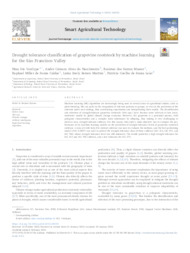Drought tolerance classification of grapevine rootstock by machine learning for the São Francisco Valley.
Drought tolerance classification of grapevine rootstock by machine learning for the São Francisco Valley.
Author(s): VERSLYPEA, N. I.; NASCIMENTO, A. C. A. do; MUSSER, R. dos S.; CALDASM R, M. de S.; MARTINS, L. S. S.; LEAO, P. C. de S.
Summary: Machine Learning (ML) algorithms are increasingly being used in several areas of agricultural studies, such as plant breeding. ML can assist in the recognition of relevant patterns or groups, or even in the prediction of the outcome under new settings, thus accelerating experiments and interpretating their results. The identification and selection of drought-tolerant grapevine rootstock (Vitis spp.) have become more relevant in late years, motivated mostly by global climate change scenarios. However, the grapevine is a perennial species, with polygenic characteristics and a complex traits inheritance by offspring, thus making it very challenging to discover new, drought tolerant cultivars. For this reason, this study's main objective was to compare the performance of six machine learning models on the prediction of drought tolerance levels of grapevine rootstock cultivars. A dataset with forty-five distinct cultivars was used to evaluate the methods, and the best performing model (AUC 0.9857) was used to predict the drought tolerance class of three cultivars (IAC 313, IAC 572, and IAC 766) whose drought tolerance level was still unknown. The results predicted a high drought tolerance for IAC 313 and IAC 766 cultivars, and a low tolerance for IAC 572.
Publication year: 2023
Types of publication: Journal article
Unit: Embrapa Semi-arid Region
Observation
Some of Embrapa's publications are published as ePub files. To read them, use or download one of the following free software options to your computer or mobile device. Android: Google Play Books; IOS: iBooks; Windows and Linux: Calibre.
Access other publications
Access the Agricultural Research Database (BDPA) to consult Embrapa's full library collection and records.
Visit Embrapa Bookstore to purchase books and other publications sold by Embrapa.

